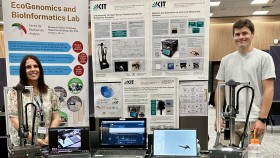Lizard genes and the biogeography of Australia’s arid zone
Mitzy Pepper
The Australian arid zone provides a unique opportunity to see how organisms responded to major climatic change
Dr Mitzy Pepper is a Postdoctoral Fellow at ANU investigating a range of evolutionary questions regarding the diversification of reptiles.
In particular, Mitzy is interested in the way gecko lizards have evolved and diversified in response to the widespread aridification of the Australian continent over the past 15 million years. Some areas of the arid zone have retained large amounts of genetic diversity due to their function as mesic refuges through time (such as the mountain ranges of the Pilbara, Central Australia and the Kimberley), and examining the genetic signatures of modern day geckos can provide information about how long species and their ancestors have been able to persist in these regions.
From an evolutionary perspective, the Australian arid zone provides a unique opportunity to see how organisms responded to major climatic change – from a primarily warm and wet environment, where flamingos and crocodiles flourished in rainforests of central Australia, to the development of the vast inland sand deserts, possibly in the last 1 million years, leaving only remnant pockets of suitable habitat for the ancestors of wet-adapted species, but providing new opportunities and habitats for those species able to adapt to drier conditions.
Utilising her background in geology in combination with molecular systematics, Mitzy’s research aims to better understand the relationship between geological and genetic landscapes, and the timing of diversification events across the Australian deserts.
Mitzy also has a keen interest in taxonomy, and has described a number of new gecko species discovered during fieldtrips and her genetic assessment of widespread desert taxa.







